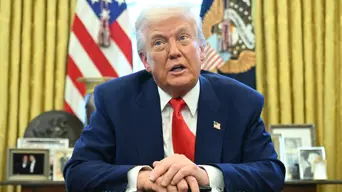'Trump before Trump': Orban's illiberal model on show
Hungarian Prime Minister Viktor Orban wants his country to serve as a laboratory of far-right ideas and an inspiration for Trump, whom the nationalist describes as 'a great friend' and is hoping for a US presidential visit.

FILE: US President Donald Trump
At the American embassy in Budapest, the atmosphere has changed since US President Donald Trump was sworn in six months ago.
"No more public scoldings. No more moralising from podiums," the new charge d'affaires Robert Palladino told guests, including several Hungarian ministers, at this month's US Independence Day celebration.
Hungarian Prime Minister Viktor Orban wants his country to serve as a laboratory of far-right ideas and an inspiration for Trump, whom the nationalist describes as "a great friend", and is hoping for a US presidential visit.
Self-touted as a "Trump before Trump", Orban has transformed the national life of Hungary, an EU member and home to 9.5 million people, during his 15-year rule.
In his drive to build what he has called an "illiberal state", he has been accused of silencing critical voices from the judiciary, academia, media and civil society, and of restricting minority rights. Trump's predecessor Joe Biden once accused him of "looking for dictatorship".
- 'Open-air museum' -
"Hungary is like an open-air museum, whose leader appears to have proved it is possible to bring back the so-called good old days," Zsolt Enyedi, a senior democracy researcher at Vienna-based Central European University, told AFP.
"Illiberal ideas have been institutionalised," he added.
Both Trump and Orban target minorities, including the LGBTQ community.
"Orban realised there was not a strong public resistance to incitation against vulnerable groups... so he leveraged these to campaign," Enyedi said.
"Similarly, Trump deports people without going through due process as American conventions would dictate," the researcher added.
US author Rod Dreher, who lives in Budapest and promotes the "Hungarian model" in the United States, praises the two leaders' common fight against the "ideological left".
"It does matter a lot to ordinary Americans when their little children are being sent to schools and being taught about transgenderism," the 58-year-old told AFP.
- 'Strongman' tactics -
In a recent discussion hosted by the Hungarian-government-financed Danube Institute, where he works, Dreher cited the example of the University of Pennsylvania, which agreed to ban biological males from its women's sports teams, settling a federal civil rights complaint.
"Pure Orban," Dreher says. "We would not have gotten that out of a normie Republican president.
"When institutions that should be neutral are so far to the left, it takes a strongman like Trump just to try to bring them back to the centre."
The Trump administration has threatened to cut funding to prestigious universities like Harvard and Columbia, criticised federal judges who suspend its decisions and is in open conflict with major media outlets.
By limiting access to certain journalists and replacing them with fringe media loyal to his cause, Trump is very similar to Orban, according to Enyedi.
"Both make it clear that they are acting out of revenge," he said.
This week, the CBS network announced the end of Stephen Colbert's "The Late Show", long a staple of late night US television, saying it was "purely a financial decision".
It came days after the comedian blasted parent company Paramount's $16 million settlement with Trump as "a big fat bribe".
But, for now, dissenting voices remain much stronger in the United States than in Hungary.
While Orban has not yet been invited to the White House in Trump's current term, envoy Palladino foresees that a visit by the US president to Budapest is "hopefully not too far off".
Such a "historic visit" would, he said, be "a reflection of real alignment between two sovereign nations that believe in tradition, strength, and identity.
"But that moment won't happen on its own. It will require vision, effort, and commitment -- on both sides of the Atlantic."